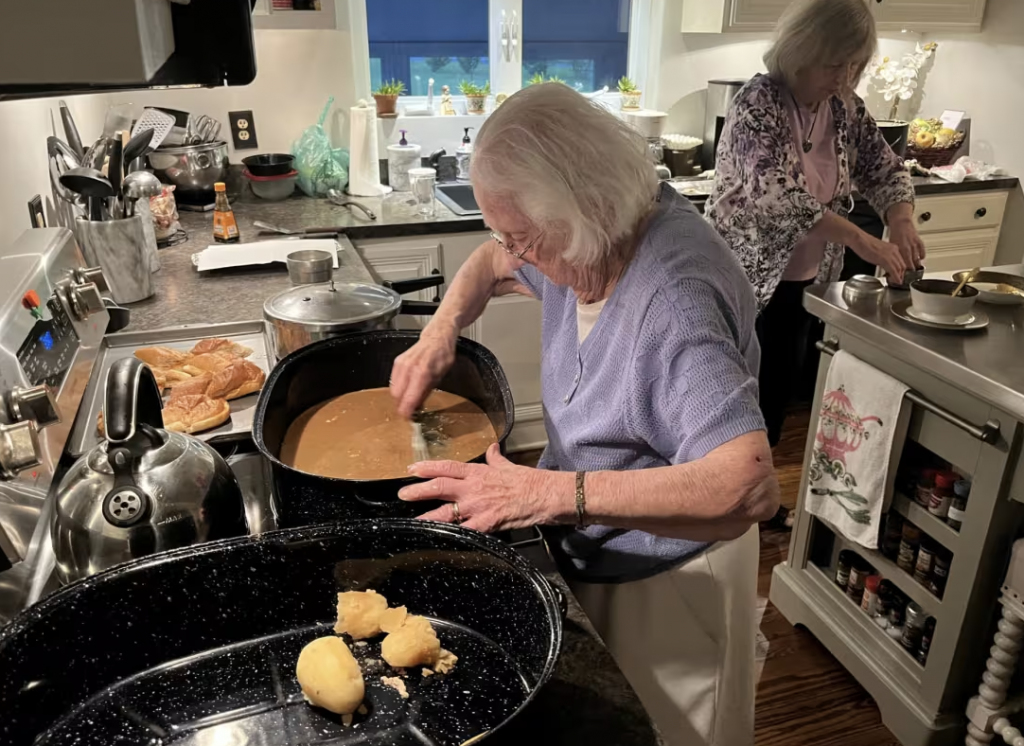A 'Radical' Life
- 100-year-old Mariam Todd’s ageless spirit and code for living can inspire people of all generations. The great-great grandmother from New Jersey works six days a week at her family’s furniture store and still drives a car, eats healthy, with a “multi-colored” plate of vegetables, has always limited her alcohol intake and has never “owned a credit card.”
- It’s the tried and true optimal lifestyle: Eating a nutritious diet can reduce inflammation in the body, which in turn, can also help lower your cancer risk.
- Limiting or avoiding alcohol can also majorly cuts down on inflammation in the body, says the American Cancer Society. If you’re contemplating reducing or stopping your alcohol consumption, you should also consider how this can can lower your cancer risk.
- Like Mariam Todd, the men and women featured in the inspiring documentary Radical Age, which is streaming on SurvivorNet TV, are not letting their ages stop them from living their best lives. These tenacious folks turned to skateboarding, mixed-martial arts, and even tattoos to define their golden years with purpose.
The New Jersey native, who works 6 days a week for a total of 50 hours at her family’s furniture store and still drives a car, has six healthy foods that she lives by, has always limited her alcohol intake, cooks at home during her time off and perhaps equally impressive for many Americans, has never “owned a credit card.”
Read MoreAs for her work ethic, Mariam explained she would not be “happy” sitting at home every day. “[I] can’t say I’m working when I enjoy what I’m doing, so I feel guilty if I say I’m working,” she said. “It’s not for everybody, but it works well for me.”
An Inherited Strong Work Ethic
“My mother was the same way,” the “very optimistic” centenarian added, noting that she “died here in the office, sitting here doing her work. She was past 80 and she died sitting at her desk. So I said if that’s God’s will for my life, so be it.”
RELATED: Beatles Rocker Ringo Starr, 83, Shares His Healthy Aging Secrets: ‘You’ve Just Got to Keep Moving’
And her customers love and appreciate that attitude. For Mariam’s 100th birthday, one of her friends brought a cake decorated with tiny furniture on top.
“It’s overwhelming,” she said of the special things people have done for her. “I just can’t believe all this love that I have felt from everybody.”
A Lifetime of Healthy Foods
Nourishing her body with healthy foods her whole life, Mariam makes sure her plate is multi-colored with assorted veggies like tomatoes, peppers, yellow squash and zucchini— and she steers clear of fast food and fried food.
“I try and eat right, sleep right and live right.”
Mariam’s granddaughter Christy Todd-Hoffman also spoke with TODAY.com, saying that a doctor once credited her genetics for her long life.

“And I said, ‘That’s not true.’ Because if you abuse your body with drugs, alcohol or smoking, you wouldn’t live this long life. She eats a very good diet.”
Eating Healthy Food Reduces Inflammation
A diet that reduces inflammation in the body can help reduce cancer. That’s what the Cleveland Clinic says.
Normally, when your body recognizes something as being foreign or potentially dangerous alcohol, bacteria, or pollen inflammation helps the immune system fight off these invaders. What actually happens is that damaged cells start releasing chemicals like histamines that sound off an alarm. They cause blood vessels to leak fluids into tissues. The tissues start swelling. Then white blood cells rush toward the damaged cells and help get rid of the toxins and dead tissue.
Cutting ‘Pro-Inflammatory’ Foods from Your Diet Can Reduce Cancer Risk
But if your body stays inflamed this way, it can be a problem. Chronic inflammation is linked to several diseases. It can lead to cancer. It also causes heart disease, diabetes, arthritis and Alzheimer’s, according to Krista Maruschak, a registered dietician at the Cleveland Clinic.
The encouraging news here is that you can reduce inflammation by reducing your intake of foods that cause inflammation. These so-called “pro-inflammatory” foods include white breads, pastas, pastries, sodas, red meats and processed meats.
You’ve heard it before, but the science is there.
Eat more “anti-inflammatory” foods instead, Maruschak recommends.
- Incorporate as many fruits and vegetables as you can throughout the day.
- Replace refined carbohydrates with whole grains like whole wheat bread and brown rice.
- Replace high-fat red meats with lean meats like chicken, turkey and fish.
- Incorporate more plant-based proteins, like beans and lentils,
- Add spices to your diet that have various anti-inflammatory properties, like cinnamon and turmeric.
Alcohol and Cancer Risk
It goes without saying, but limiting or avoiding alcohol also majorly cuts down on inflammation in the body. If you’re contemplating reducing or stopping your alcohol consumption, you should also consider how this can can lower your cancer risk.
The American Cancer Society warns that alcohol consumption can increase your risk for many different types of cancer, namely with cancers of the mouth, throat, voice box and esophagus.
RELATED: Stressed Over a Cancer Diagnosis? 6 Tips to Help You Avoid Reaching for Alcohol
Additionally, the ACS notes that drinking and smoking together puts you at a much higher risk for these diseases.
“This might be because alcohol can help harmful chemicals in tobacco get inside the cells that line the mouth, throat, and esophagus,” the ACS website states. “Alcohol may also limit how these cells can repair damage to their DNA caused by the chemicals in tobacco.”
When it comes to liver cancer, “long-term alcohol use has been linked to an increased risk.” When you regularly drink a lot of alcohol, liver damage can occur and lead to inflammation and scarring — a possible explanation for the increased risk.
More Inspiration on How to Live a ‘Radical’ Life
Like Mariam Todd, the men and women featured in the inspiring documentary Radical Age are not letting their ages stop them from living their best lives. Defying expectations for people over 55, their spirits are staying fresh and vibrant through unorthodox means.
Recreational activities often associated with young people are fueling the tenacious warriors featured in the film, which is streaming on SurvivorNetTV. They turned to skateboarding, mixed-martial arts, and even tattoos to define their golden years with purpose.
“The only thing I clung to during all that was martial arts, the whole time,” Ann Perez de Tejada said.

De Tejada, 70, battled stage 2 breast cancer. During her treatment, she also trained in mixed martial arts. “I’d go from chemo or work to jujitsu.”
Not all the men and women featured in the documentary have battled cancer or disease. Some of the other obstacles they worked to overcome include the loss of a loved one, grief and/or depression. One thing they all share: resilience and passion amid adversity.
“Thank the skateboard Gods. This saved my life,” said Neal Unger, 66, who struggled after losing his wife to ovarian cancer. “When you lose someone dear to you, you are literally ripped apart and you don’t know what to do.”
After turning to skateboarding to help cope with his emotions, he is now famous within his community.
SurvivorNetTV Presents: ‘Radical Age’ A Story of Seniors Defying Expectations
Helen Lambin, 84, shares a similar story to Unger because she lost her husband of nearly 40 years to an aneurysm. To help deal with the grief, she began getting tattoos at the age of 75. The new ink, an artistic, therapeutic hobby helped her find joy amid a devastating loss.
“If I’m going to have people look at the tattoos, I want them to see something positive,” Lambin said. She now has about 100 tattoos that make her feel alive and energized.
“Ageism has been the toughest opponent. It basically has been like walking into the mouth of the lion,” de Tejada explained in the documentary.
Whether it is combating ageism or finding joy amid adversity, the insightful stories these seniors share will inspire you in the documentary Radical Age.
Learn more about SurvivorNet's rigorous medical review process.

